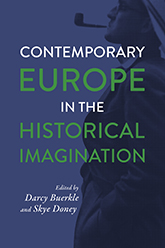|
Contemporary Europe in the Historical Imagination
Edited by Darcy Buerkle and Skye Doney
George L. Mosse Series in the History of European Culture, Sexuality, and Ideas
Steven E. Aschheim, Skye Doney, Mary Louise Roberts, and David J. Sorkin, Series Editors
“Mosse’s pathbreaking work on fascism, masculinity, Judaism, war, and genocide still reverberates a quarter century after his death. The wide-ranging, topical, and persuasive essays in this volume show how the intellectual seeds Mosse planted as a scholar and teacher continue to bear fruit.”
—Daniel Magilow, University of Tennessee, Knoxville
Exploring the continued influence of George L. Mosse’s work
George L. Mosse (1918–99) was one of the most influential cultural and intellectual historians of modern Europe. In Contemporary Europe in the Historical Imagination, an international assembly of leading scholars explore Mosse’s enduring methodologies in German studies and modern European cultural history. Considering Mosse’s life and work historically and critically, the book begins with his intellectual biography and goes on to reread his writings in light of historical developments since his death, and to use, extend, and contend with Mosse’s legacy in new contexts he may not have addressed or even foreseen.
The volume wrestles with intertwined questions that continue to emerge from Mosse’s pioneering research, including: What role do sexual and racial stereotypes play in European political culture before and after 1945? How are gender and Nazi violence bound together? Importantly, the contributors pose questions that are inspired by Mosse’s work but that he did not directly examine. For example, to what extent were Nazism and Italian Fascism colonial projects? How have popular radical right parties reinforced and reimagined ethnonationalism and nativism? Much like Mosse’s own work, the chapters in this book inspire new interventions into the history of gender and sexuality, Jewish identity during the rise of the Third Reich, and the many reincarnations of fascist pageantry and mass politics.
Darcy Buerkle, a professor of history at Smith College, is the author of Nothing Happened: Charlotte Salomon and an Archive of Suicide.
Skye Doney is the director of the George L. Mosse Program in History at the University of Wisconsin–Madison and at the Hebrew University of Jerusalem. He is the author of The Persistence of the Sacred: German Catholic Pilgrimage, 1832–1937.
Praise
“A big book, in multiple senses of the word. . . . Considering the role that Mosse’s scholarship has played in many fields, a broad volume that considers his life, his work, and many of the subjects that interested him should command attention and disciplinary conversation. Even more: Mosse’s books and this intriguing volume encourage us to take historical knowledge and wrestle with ‘the big questions,’ a message as germane in 2023 as it was in Mosse’s time.”
—Jay Geller
Table of Contents
Contents
List of Illustrations
Preface: Mosse’s Berlins
Darcy Buerkle and Skye Doney
Introduction: George L. Mosse: The Work, the Legacy, the Man
Steven Aschheim
Part I. George L. Mosse (1918–1999)
1 Civilizing the Nation: Can Mosse’s Europe Be Saved?
Aleida Assmann
2 Past Subjunctive: George L. Mosse’s Memoir
Darcy Buerkle
Part II. New Politics of Exclusion
3 Conceptualizing Fascism: The Legacy of George L. Mosse
Enzo Traverso
4 Women, Gender, and the Radical Right: Then and Now
Mary Nolan
5 Behemoth Rises Again: On Twenty-First-Century Fascism
Andreas Huyssen
Part III. Gender, Violence, and the Everyday
6 Sex and Violence: Race Defilement in Nazi Germany
Stefanie Schüler-Springorum
7 People Working: Leisure, Love, and Violence in Nazi Concentration Camps
Elissa Mailänder
Part IV. Soldiers
8 Morality, Nazi Ideology, and the Individual in the Third Reich: The Example of the Wehrmacht
David Harrisville
9 Reading Mosse in Jerusalem: Fallen Soldiers and Israel’s Culture of Commemoration
Arie Dubnov
Part V. German Jews beyond Berlin
10 Religious Commitment and Leadership among German-Jewish Women in the Early Twentieth Century
Sarah Wobick-Segev
11 Who Owns the German Language? Zionism from Hochdeutsch to Kongressdeutsch
Marc Volovici
12 Photography between Empire and Nation: German-Jewish Displacement and the Global Camera
Rebekka Grossmann
13 Max Nordau between George L. Mosse and Benzion Netanyahu
Adi Armon
Part VI. Mosse and Berlin: Then and Today
14 “There’s Nothing Innocuous Left”: The Everyday Transfigured
Robert Zwarg
15 Absence/Presence: The Berlin Mosse Topography
Elisabeth Wagner
16 The Mosse Art Research Initiative (MARI) at Freie Universität Berlin
Meike Hoffmann
17 The Mosse Family in Berlin: Cultural Capital for Subsequent Generations
Frank Mecklenburg
Afterword: A Family Message: The Mosse Berlin Legacy
Roger Strauch
Bibliography
Contributors
Index
|

Larger images
June 2023
352 pp. 6 x 9
80 b/w illus.
|

